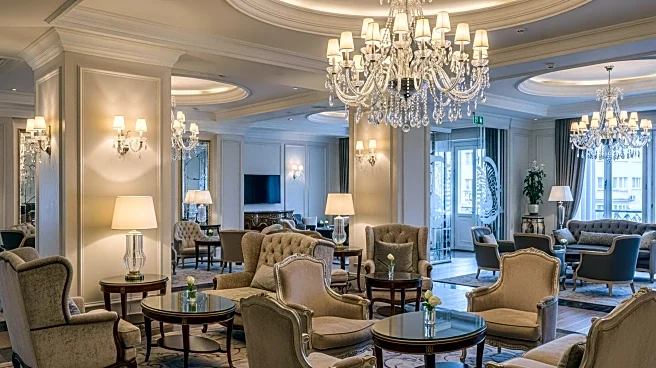What's Happening?
Hotel performance in the Middle East has seen significant growth, particularly across the six Gulf Cooperation Council (GCC) countries: Bahrain, Kuwait, Oman, Qatar, Saudi Arabia, and the United Arab Emirates. In August, the revenue per available room (RevPAR) increased by 11.7% year over year, driven by gains in both occupancy and average daily rate (ADR). This growth is attributed to a slowdown in new hotel supply, which has allowed existing hotels to exercise greater pricing power. The supply growth for these countries is currently at 0.6% year to date, a notable decrease from the 4.5% long-term average. Despite this, there are still 67,000 rooms under construction, with Saudi Arabia leading the charge as part of its Vision 2030 plans. Additionally, leisure demand has been a significant factor, with destinations like Abu Dhabi experiencing a renaissance, attracting both regional and international visitors.
Why It's Important?
The surge in hotel performance in the Middle East is significant for several reasons. It highlights the region's ability to attract tourists and business travelers despite global economic uncertainties. The slowdown in new supply has created a favorable environment for existing hotels to capitalize on increased demand, potentially leading to higher profitability. This trend is particularly beneficial for Saudi Arabia, which is heavily investing in its tourism sector as part of its Vision 2030 initiative. The growth in leisure demand also underscores the region's appeal as a tourist destination, which could have long-term positive effects on the local economies and employment rates. The increased focus on tourism and hospitality could also lead to more international events being hosted in the region, further boosting its global profile.
What's Next?
Looking ahead, the Middle East's hotel industry is poised for continued growth, especially as the region enters its cooler winter months, which traditionally attract more tourists. Upcoming events such as the WFC Rally in Jeddah, the Formula 1 race in Abu Dhabi, and the MDLBEAST Soundstorm festival in Riyadh are expected to draw significant crowds. Additionally, corporate events like the Dubai Airshow and the ADIPEC trade fair in Abu Dhabi will likely boost business travel. The ongoing construction of new hotel rooms, particularly in Saudi Arabia, suggests that the region is preparing for sustained growth in the tourism sector. However, the industry must remain vigilant to global economic shifts that could impact travel demand.
Beyond the Headlines
The developments in the Middle East's hotel industry could have broader implications for global tourism trends. As the region continues to enhance its infrastructure and marketing efforts, it may become a more competitive player in the international tourism market. This could lead to shifts in travel patterns, with more tourists opting for Middle Eastern destinations over traditional Western locales. Additionally, the focus on luxury and family-friendly attractions could set new standards for hospitality in the region, influencing hotel development and service offerings worldwide.










